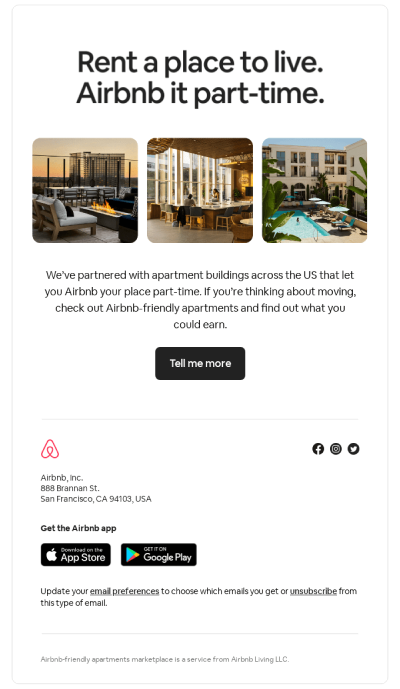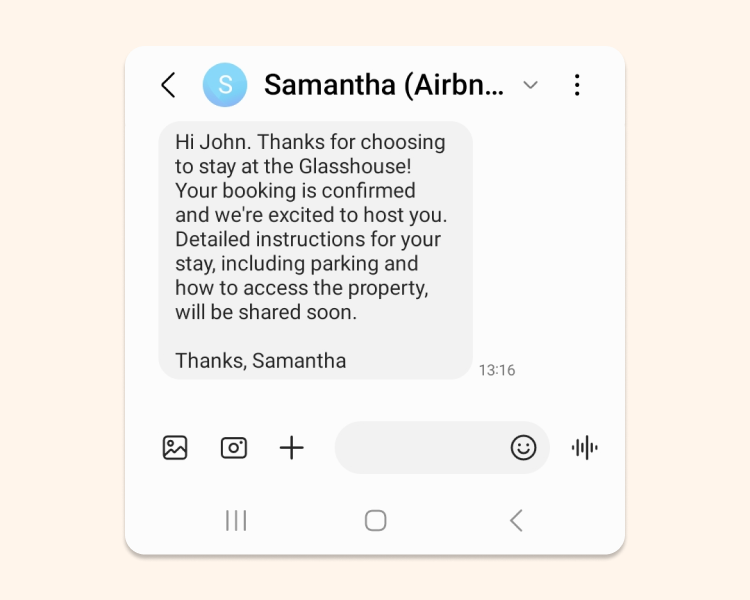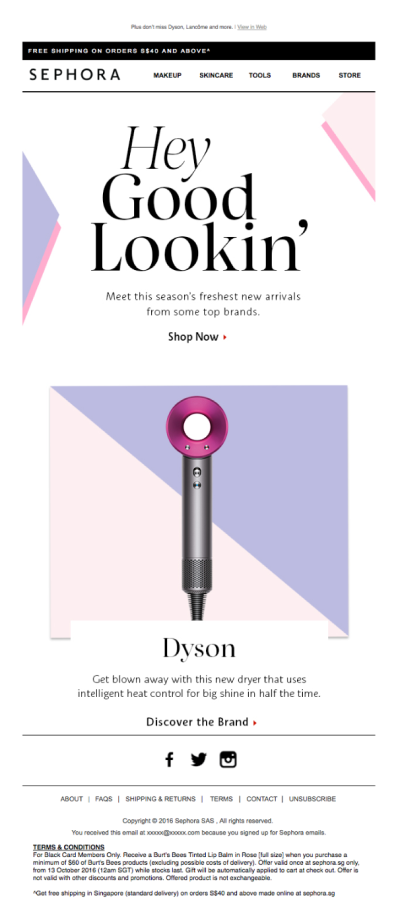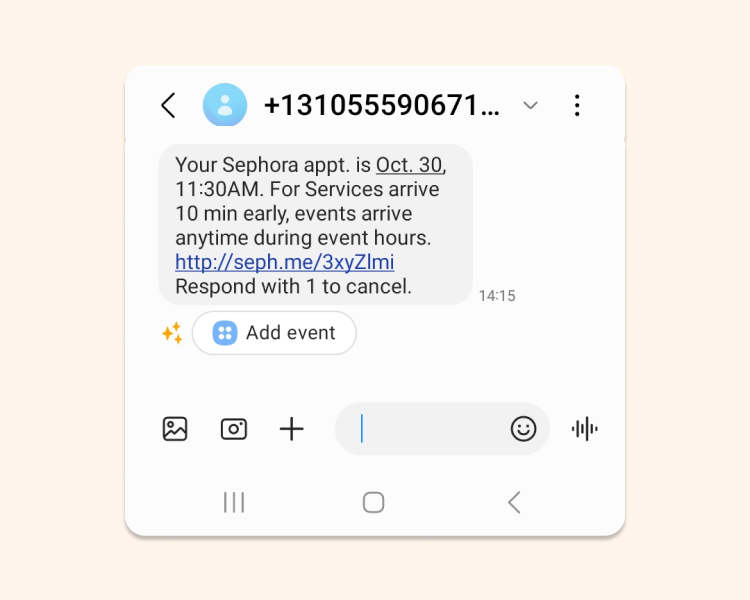SMS vs. Email Marketing—Which Channel Reigns Supreme?
Learn about the distinct advantages of both SMS and email marketing and how you can leverage them to their fullest.
Updated December 17, 2023

SMS messages have an open rate of 98%, while email marketing hovers at an average open rate of 20%. Now, imagine the impact of harnessing both SMS and email marketing. This kind of omnichannel marketing strategy is easier to pull off than you may realize. We'll look at the data-backed benefits of using this strategy and see how it can improve how you engage with and keep your customers.
» Diversify your traffic to generate more leads with our omnichannel marketing guide.
Meet the expert
Yaron Been is a renowned growth coach and eCommerce entrepreneur, having built and scaled multiple 7-figure stores. He also hosts The EcomXFactor Podcast and has managed over $10 million in Facebook ad campaigns for various DTC brands.
What is SMS marketing?
SMS marketing is a straightforward way to connect with your audience through concise text messages. It's a direct and instant channel, delivering your messages right to their mobile phones without the need to navigate through inboxes. The personal touch of a text message ensures your updates, deals, or reminders get noticed promptly.
What is email marketing?
Unlike the speedy text vibe of SMS, emails give you a bit more space to tell your story, showcase products, and drop those clickable gems. This makes it ideal for building a more in-depth connection and delivering a bit more substance with each message.
SMS vs. Email marketing: Pros & cons
While both channels are valuable, SMS and email marketing have distinct characteristics. Let's take a closer look at the pros and cons of each.
SMS marketing
SMS marketing is a much more personal channel and is used to communicate on a much personal level with specific segments of your audience - such as your loyal and potentail customers. You can use it to send delivery updates, shipping notifications, as well as short-form promotional content.
It has much higher engagement - 97% open rates, with 90% of messages read within 3 minutes, and a 45% response rate.
However, it can quickly get annoying if overdone, and it's permission-based so you've got to be mindful of not bombarding folks. It also has a character limit so you gotta keep things short.
Pros
- High open rates
- Immediate
- High engagement
- Compact and concise
- Mobile-friendly
- Higher deliverability
Cons
- Character limit
- Permission-based
- Costly
Email marketing
Email marketing is cost-effective, delivering rich content, segmentation, automation, and robust tracking. However, it can be challenging to stand out amidst crowded inboxes. This is where crafting attention-grabbing yet balanced content, fine-tuning segmentation, and deciphering analytics come in. They're all crucial components of a successful email marketing strategy.
Pros
- Cost-effective
- Rich content
- Segmentation
- Automation
- Tracking and analytics
Cons
- Lower open rates
- Must be optimized for mobile
- Delayed communication
What to consider when combining SMS and email marketing strategies
Email and SMS marketing play nicely together. Since many email marketing platforms offer both solutions within the same framework, it's pretty easy to implement. The key is to ensure they bounce off each other well, combining to form a more robust strategy.
To do this, you can:
- Treat SMS and email as equals: It's best to treat email and SMS marketing as equals in your customer retention strategy. For instance, you can use both email and SMS in your automated email flows to keep customers engaged.
- Make your SMS messages stand out: With inboxes flooded by emails, SMS messages stand out. People aren't bombarded with SMS spam daily, making it a less crowded space for brands to capture attention.
- Understand the legal considerations: SMS marketing is sometimes overlooked due to potentially complicated legal considerations. But dismissing SMS marketing can be a big mistake, given its potential for excellent results. Brush up on the requirements like the CAN-SPAM Act to take advantage of SMS marketing.
Comparing email and SMS marketing
The choice between email and SMS marketing depends on the audience and your marketing goals. Email is generally better for speaking to and retaining a larger audience, while SMS is more personal and suited for engaging with the most loyal customers and specific audience segments. Combining both can be a potent strategy, depending on where customers are in their journey.
Timing is vital to your SMS marketing strategy, as customers are less likely to return to the messages you send them. In contrast, email users tend to open messages when they can spare some time, making timing less critical. Understanding these differences will help you optimize your marketing strategies for each channel.
Automation that sounds more authentic
Automated email campaigns are beneficial for engagement but may not address the reasons behind a customer's decision. In contrast, SMS marketing, with its conversational approach, bridges the gap by providing a more human touch.
SMS marketing tools allow for immediate interaction, addressing customer queries, and building closer relationships with customers. This human element is crucial for turning undecided customers into promoters and, ultimately, increasing sales.
Building trust and increasing sales
The end goal is to connect with customers on a personal level, building trust and transforming them into promoters. While email marketing excels in reaching a broader audience and providing automated responses, SMS marketing, especially when conversational, adds the human touch necessary for addressing individual concerns and driving sales.
The key is to find a balance and leverage the strengths of both channels to create a non-intrusive and engaging marketing strategy.
Examples of SMS and email marketing in action
Let's explore real success stories and smart strategies that businesses use to connect with their audience, increase conversions, and create lasting bonds through SMS and email marketing.
Airbnb
Airbnb meticulously tailors its email experience, strategically guiding users through sequences like their behavioral email series. Encouraging users to choose a continent, trip theme, and ideal home, the journey kicks off with an engaging subject line. Subsequent emails, personalized based on user preferences, unfold seamlessly.
For example, if Europe is selected in the initial email, the next email beckons with "Your adventure in Europe awaits."
This personalized progression extends to specific interests, shaping each email to reflect the user's unique preferences, such as a follow-up subject line like: "Ready to embark on a romantic adventure in Europe?" Airbnb's approach ensures a concise, yet highly customized, email journey for each traveler.
Airbnb then uses SMS text messages for notifications such as reservation reminders, helpful tips to improve your trip, as well as promotions and tips. Airbnb also uses SMS for quick and cost-effective communication between hosts and guests. If a host hasn't responded to a booking request, Airbnb sends an automated SMS with guest details, requested dates, and pricing, facilitating a swift text-based response from the host.
Sephora
Sephora works its magic on each platform in its unique style. For instance, they use email for restock reminders and product recommendations.
They then use SMS messages for things like appointment reminders, order tracking updates, and back-in-stock notifications. These messages are tailored to the customer's preferences, which means the client only receives specifically requested information. Sephora's strategy is all about meeting customers on the channel that's most convenient for them, making it easier to engage with their content and take the desired action.
How to leverage email and SMS marketing for the holiday season
The holiday season, including Black Friday and Cyber Monday, presents a unique business opportunity. However, with rising advertising costs and fierce competition, it's essential to strategize effectively to keep those conversion rates high. Rather than attempting to outspend larger competitors on advertising, consider doubling down on retention efforts through email and SMS marketing.
- Build anticipation: Creating excitement around your Black Friday and Cyber Monday deals can be highly effective. Send out SMS messages and email marketing campaigns to inform your subscribers about upcoming discounts.
- Offer exclusive discounts: Instead of slashing prices only on these special days, consider offering exclusive discounts to your loyal customers beforehand. This can make your existing customer base feel valued and appreciated.
- Avoid the discount race: While matching competitors' steep discounts is tempting, it's not always sustainable. Be cautious about selling products at a loss. Some discounts advertised during this season may not be as substantial as they appear, so prioritize honesty with your customers.
Remember, the holiday season is a prime time to engage with your existing customer base and strengthen brand loyalty. By strategically using email and SMS marketing, you can make the most of this busy shopping period without breaking the bank.
Want to create winning campaigns for other holidays? Check out our other guides:
- Winning labor day marketing campaigns
- Stunning memorial day emails
- March Madness marketing ideas
Using SMS and email for cart abandonment recovery
Conquering abandoned shopping carts in online retail is no easy task. SMS and email can help you tackle this challenge head-on by engaging customers across multiple touchpoints, thus increasing the chances of converting potential sales.
SMS
- Send a friendly nudge: Shoot a quick SMS reminding customers about the items they left behind in their carts.
- Exclusive perks: Sweeten the deal by offering special discounts or incentives, making it hard for them to resist checking out.
- Detailed follow-up: Craft marketing emails with extra care, showcasing product recommendations and customer reviews, and reiterate why they should buy your product.
- Reinforce value: Email is an effective way to emphasize your brand's unique value proposition, building a stronger connection and trust with potential buyers.
» Discover the best eCommerce SMS marketing strategies.
Loyalty program engagement
You can also combine email and SMS in your loyalty program communication. SMS delivers real-time updates on loyalty points and exclusive offers, even celebrating milestones. Email, on the other hand, steps in with visually engaging content, showcasing program perks like member events and personalized rewards.
SMS quick hits
- Instant updates: Keep loyalty program members in the loop with real-time SMS alerts on points, exclusive offers, and personalized messages celebrating their loyalty milestones.
Email visuals
- Showcase benefits: Leverage the visual appeal of email to highlight the broader perks of your loyalty program, such as member-only events, early access, and personalized rewards.
SMS vs. email marketing: Which one is right for your business?
As you weigh the decision between SMS and email marketing, it ultimately boils down to what aligns best with your business's unique needs, goals, and understanding your customers.
The decision-making process should be a reflection of your company's identity and the unique relationships you cultivate with your audience. The personalized approach of both ensures that your marketing efforts not only make sound business sense but also authentically align with the heart and soul of your brand.
Email is better for long-form content, with lots of visuals and automation built in. It's great for automatic sequences, welcoming subscribers, and retargeting your customers. Text messages are best for short content, time-sensitive updates, and conversations. When you combine the two channels you're able to reach more customers with more effective messaging.
For all its benefits, SMS marketing does have some disadvantages. Your message needs to be very short - you do not have much space. You can also overwhelm your audiences with unwanted texts. Make sure you get permission to send your SMS marketing campaigns and that you comply with all the privacy and data protection regulations out there.
FAQs
What is the advantage of email over SMS?
Email is better for long-form content, with lots of visuals and automation built in. It's great for automatic sequences, welcoming subscribers, and retargeting your customers. Text messages are best for short content, time-sensitive updates, and conversations. When you combine the two channels you're able to reach more customers with more effective messaging.
What are the disadvantages of SMS marketing?
For all its benefits, SMS marketing does have some disadvantages. Your message needs to be very short - you do not have much space. You can also overwhelm your audiences with unwanted texts. Make sure you get permission to send your SMS marketing campaigns and that you comply with all the privacy and data protection regulations out there.
What is the success rate of SMS marketing?
SMS (short message service) marketing is a much more engaging marketing channel than email. It has a 97% open rate, with 90% of messages read within 3 minutes. It also has a 45% average response rate. In contrast, email messages get open rates of 20%-30% and 1%-2% click-through rates.
When should I use SMS marketing?
Text message marketing can work really well for any kind of business. You should use it when you want to engage with your audience of potential customers on a more personal level and be more conversational. Make sure to use an email service provider has both email and SMS features. The best time to send marketing messages is between 1 and 5 pm according to one study, but it really depends on your audience. You should test out sending your SMS marketing messages around the time you send your email campaigns.








